Discover The Organic Gardening Podcast
The Organic Gardening Podcast

The Organic Gardening Podcast
Author: Garden Organic
Subscribed: 1,605Played: 33,983Subscribe
Share
© Garden Organic
Description
Inspiration to help you garden the organic way, with advice, tips and interviews from the UK's leading organic gardening organisation, Garden Organic. Hosted by Fiona Taylor and Chris Collins.
99 Episodes
Reverse
This month, Chris chats with Jo Ferguson, Built Environment Manager at The Bat Conservation Trust. Jo has been involved in Bat conservation for over 15 years, and specialises in urban ecology and enhancing the built environment for bats. She shares why bats are important to the ecosystem, and how you can look after bats in urban gardens.
Also in this episode...
We’re reflecting on the triumphs of the 2025 gardening year. Fiona and Chris share their successes, and maybe a few fails as they prepare for a new year of sowing and growing. In the postbag, Fiona, Chris and Anton answer your questions on growing asparagus, sowing garlic and shallots, and our favourite topic, composting!
This month, we’re celebrating the slow beauty of autumn, from the changing of the leaves to creating colourful bulb trifles. There’s still so much joy you can get out of your garden, as we prepare for shorter days and longer nights.
In this episode, Fiona chats with Helena Dove, Kitchen Gardener at Royal Botanic Gardens Kew. Helena has a wealth of knowledge surrounding the physiology of vegetables, and teaches us how we can better understand the makeup of plant life.
In the postbag, Fiona, Chris and Emma answer your questions on using black plastic on the compost heap, how to help overwintering larvae, and how to prevent your apples from developing bitter pit.
In this month’s episode, we're joined by Raymond Blanc OBE from his kitchen garden at Le Manoir aux Quat Saisons. We toured the garden, which is home to over 100 heritage vegetable varieties. Raymond talks about his own gardening heritage, and how growing with his mother and father in France influenced the direction he's taken with Le Manoir's kitchen garden. We also hear from August Bernstein, head of the Raymond Blanc Gardening School, who chats with us about the relationship Le Manoir have with our Heritage Seed Library.
Also in this episode:
Fiona and Chris catch up in the potting shed to talk about their gardening tasks for October, and Lead Horticulturalist for the Heritage Seed Library, Marcin Salnikov joins the podcast this month to answer your questions on seed saving and heritage varieties.
In this month’s episode, we’re diving deep in to the world of Green Manures, as Dr Anton Rosenfeld, Research Manager at Garden Organic explains how sowing these plants can be central to looking after your soil.
Also in this episode:
Fiona and Chris catch up to see how their harvests are going this year, and we answer your questions on what type of sand you can use in the garden, when not to harvest rhubarb and what to do when your potato plants result in no yield whatsoever.
For more advice on Green Manures visit our website: https://www.gardenorganic.org.uk/expert-advice/garden-management/soil/green-manures
In this month's podcast, we're joined by garden designer, broadcaster, and author Juliet Sargeant. Juliet has just released her first book, Start with Soil, in collaboration with the Royal Botanic Gardens, Kew. She discusses the global impact of soil degradation and shares how gardeners can take control of their own soil health with simple at-home testing.
Also in this episode...
Fiona and Chris celebrate a summer of gardening successes (despite a few heatwaves), and Anton joins to answer your questions on banana peel water, no-dig gardening in raised beds, and whether it’s safe to use washing-up liquid in the garden.
In this month’s Organic Gardening Podcast, Fiona welcomes back seed guardian and writer Adam Alexander. Adam has travelled the world gathering heritage and land race vegetable seeds and in his latest book, tells the story of our “accidental seed heroes.” The backyard growers that are doing something extraordinary, championing old varieties, and also creating new generations of fruit and vegetables.
Also in this episode...
Fiona and Chris reflect on their visit to BBC Gardeners’ World Live, What they learned from our rooted in nature show garden and what inspired them. They also share tips for coping with a potential hosepipe ban, from watering priorities to keeping your compost moist.
In the postbag, the team answers your questions on how to manage aphids, the causes behind tomato leaf curl and solve a common problem with spinach and chard plants.
In this month's Organic Gardening Podcast, Fiona visits Huw Richards, in his experimental permaculture garden in Mid-West Wales. Huw gives us an insight in to the the principles of permaculture through his 7 acre garden, as we explore his linear food forest, syntropic planting, and how permaculture fits in with the organic principles.
Also in this episode...
Fiona and Chris are catching up on their planting progress after an incredibly dry spring. In the postbag, Anton Fiona and Chris answer your questions on pernicious weeds, grafted fruit trees and how to reuse your grey water.
This month, Fiona visits trained ecologist and author Becky Searle. Becky has been showing the world how to garden organically via her Instagram account (@sowmuchmore) since 2018. This year, Becky embarked on a new journey with the release of her first book “Grow a new Garden.” Fiona and Becky spoke about what ignited her passion for gardening, the role ecology plays in her garden and the importance of seed saving.
Also in this episode...
Chris is away this month, so Fiona is joined by Jules Duncan, one of our expert organic gardeners at Ryton. They reflect on the beauty of May, and Fiona gets some germination troubleshooting! In the postbag, Jules, Fiona and Anton answer your gardening conundrums. Tackling what to grow underneath fruit trees, how to successfully grow Chayote, and we go back to basics with the do’s and don’ts of organic growing.
This month, Fiona visits author and garden writer Kate Bradbury, at her garden in Brighton. Kate shared her passion for wildlife-friendly gardening and the power of small actions to create meaningful change. Fiona and Kate discussed how connecting with nature, whether by planting pollinator-friendly flowers, creating habitats, or simply observing the life in our gardens, can combat eco-anxiety and create a community.
Also in this episode...
It's sowing time at Chris’s Allotment, and Fiona discusses the 5 vegetables she’s growing this year. Chris, Fiona, Anton and special guest Pauline Pears answer your questions in the Postbag, sharing advice on if you should be cleaning your water butt, how to look after a pond, and vegan organic substitutes for bone meal.
This month, Fiona speaks with Tristram Stuart, award-winning author and campaigner, about the positive trends in reducing food waste and his unique approach to sustainable farming. Hear how his cattle are "enhancing the wilderness," and discover his perspective on the global food system. Tristram also inspires us to connect with nature, whether through small garden projects or community initiatives.
Also in this episode...
Spring is here, and Fiona and Chris are excited to get seed sowing. Chris, Fiona, and new guest Jules answer your questions in the Postbag, discussing healthy houseplants, comfrey, and how to grow successfully in a bed affected by raspberry blight.
In this month's episode, Fiona and Anton spoke with Eddie Bailey. Eddie has spent years studying the soil during his career as a geologist and now shares what he's learnt with gardeners and growers through his company, Rhizophyllia.
"In my garden, the effect I had when I stopped digging was instantaneous, the following season, germination rates just dramatically improved and got better and better within three years. It was a completely different landscape. The soil is absolutely critical to our health on this planet."
Also in this episode...
Fiona and Chris are "chomping at the bit" to get sowing and growing, and in the postbag, the team tackle questions on organic topsoil, rats, and plants that grow well on damp ground.
Join us as we recap an interesting year in organic gardening. From persistent rainfall and slug battles to delightfully late harvests, we've faced it all with a dose of humour and a lot of resilience. In this month's episode, we're looking back on your most intriguing questions from 2024, exploring everything from suspicious strawberry piles to the secrets of healthy soil. You may even hear questions you haven't heard before!
This month, Fiona visited River Cottage, to chat with Author, Chef and Fermentation Expert Rachel DeThample. Rachel breaks down how eating organically grown vegetables can have a positive impact on the gut microbiome, and dives in to how fermenting the produce from your garden can lead to better nutrition and a stronger connection to nature.
“We’re a no dig garden, all organic” says Rachel, “so we’re constantly feeding the soil with healthy ingredients to help with it’s diversity, and that’s a really lovely way of reflecting that you can do the same thing with your own microbiome, feed it lots of diversity which helps create a healthier balance”
Also in this episode…
Fiona and Chris chat about how gardening and being outdoors in winter improve your wellbeing. In the Postbag, the team answer your questions on the use of Bacillus thuringiensis, a broccoli that’s struggling to sprout, and whether frozen beans will germinate!
Listen now here or via your podcast provider. Thanks again to our sponsors, Viridian Nutrition. Visit their website at www.viridian-nutrition.com.
This month, Fiona meets Åsa Gregers-Warg, head gardener at Beth Chatto Plants and Gardens. They tour the gardens, and reflect on Beth Chatto’s legacy, discussing how we can adapt our gardens to promote resilience and withstand changing environmental conditions.
“We haven't used any herbicides or pesticides for the last few years. And we all have to be water wise these days as well. It started off with the gravel garden being the only part of the garden that was never irrigated. But since a couple of years ago, we don't water the rest of the gardens either.”
Also in this episode…
Fiona and Chris are preparing their gardens for winter, even in the cooler months there’s still plenty to do! In the postbag, the team tackle questions on reusing old compost, dealing with coddling moth, and why it's crucial not to leave soil bare at this time of year.
Thanks again to our sponsors, Viridian Nutrition. Visit their website at www.viridian-nutrition.com.
It's safe to say the weather has been incredibly unusual this year. A wet cold spring was followed by a slug-filled summer. And here in the Midlands, we’ve already experienced our first frosts!
Sally Morgan, author of the Resilient Garden Handbook, has been tackling these challenges head on. She speaks with Fiona about what makes a resilient garden, and how we can overcome unusual growing conditions.
“We’re perhaps the first generation of gardeners who can't look back to their grandfathers and ask for advice. I know what my grandfather would tell me and it's totally not applicable to today's style of gardening and conditions. So we’re learning on the job. Everybody will be different because everybody's micro-habitat is different to the next.”
Also in this episode…
Fiona and Chris are already planning next year's food growing, and Chris encourages you to keep on sowing - even through the winter months. In the postbag, the team tackle a complicated compost query, and investigate some troublesome tomatoes.
Thanks again to our sponsors, Viridian Nutrition. Visit their website at www.viridian-nutrition.com
As the nights draw in, Chris sits down with Nick Dunn, professor of urban design at Lancaster University. Nick is also the founding director of the Dark Design Lab, exploring the impacts of nocturnal activity on nature. Nick enlightens us about the role darkness plays in our gardens and artificial light's impact on the wider environment.
“What light pollution basically does is it alters the way plants and animals behave. The classic example is of moths being drawn to bright lights. But beyond that it's much more serious because it can interfere with important feeding, mating, navigating and also prey-predator relationships”
Also in this episode…
Despite the late start, Fiona and Chris celebrate their growing successes, and tell you why you should try “seed rambling”. From the postbag, the team troubleshoot how to bring life to contaminated clay soil, what you can do with a problematic rosemary bush and how to rescue a diseased rose.
Thanks again to our sponsors, Viridian Nutrition. Visit their website at www.viridian-nutrition.com
Fiona chats with Nick Mole, Policy Officer from the Pesticide Action Network (PAN) UK who shares why pesticides should be banned from use in our urban spaces, and how communities can be affected by pesticide use.
“Knowing that there are alternatives to pesticides that do work, pesticide use in our towns and cities is completely unnecessary. France has banned the use of all non-agricultural pesticides. They have legislation in place and it works. It is often hard, councils are facing all sorts of difficulties. So we do need that support from our legislators.”
Also in this episode…
Chris and Fiona discuss why hardy annuals are popping up in Chris’ allotment now, and look forward to September seed sowing. From the postbag, the team troubleshoot a late flowering courgette, and with the help of listeners, find out what animal was causing last month’s strawberry piles!
Thanks again to our sponsors, Viridian Nutrition. Visit their website at www.viridian-nutrition.com
Sign the petition to ban the use of pesticides in urban spaces https://pesticidecollaboration.org/go-pesticide-free/
What do bed sheets, hessian and bacteria have in common? They might help us reduce the amount of plastic we use in our veg plots!
Award-winning author, gardener, peat- and plastic-free advocate Sally Nex shares fascinating advice for reducing, reusing and recycling the 500 million pots, seed trays, and other bits of plastic we get through in our gardens every year in the UK.
“When we chip a pot and it goes directly into our soil, it's going to stay there for the next 400 years,” says Sally. “Experiments have shown that earthworms, which are living in soils high in microplastics, lose weight and soil biodiversity is a fraction of what it is in clean soils.”
Also in this episode…
Chris and Fiona chat about the delay in germination and plant growth due to the cool start to the summer – and reassure that it’s not too late to sow now. From the postbag, Anton advises on using organic slug pellets, and the team mull over what creature might be creating ‘strawberry piles’!
We’ve got a double bill this month to help you save more water in your garden over the summer.
We’re joined by Jo Osborn from the charity Waterwise – who tells us that in England alone, we face a potential water deficit of close to 5,000 million litres of water every day by 2050. She shares how crucial it’s we conserve more of it in our homes and gardens.
And climate change gardening guru Sally Morgan talks rainwater and grey water harvesting. She reveals ways to water plants more effectively, and the importance of soil health.
“No dig is important because we don't want to disturb the fungi in the soil,” she says. “Most plants have a relationship with the mycorrhizal that extends beneath the plant – and it’s this fungus network that does the watering for them, finding water in the soil.”
Also in this episode…
We'll be answering your questions about how to deal with box hedge moth, what to do about allotment-loving ants, and how to tackle chilies that are not hot.
In this month’s Organic Gardening Podcast, Chris Collins chats to Nick Hamilton – son of organic gardening pioneer Geoff Hamilton – and finds out more about his gardening journey and life at his beloved Barnsdale Gardens.
We’ve always had a close relationship with the gardens and Nick, a former Garden Organic trustee, and shared many planting schemes and plant cuttings over the years. Our ‘Paradise Garden’ (now part of Coventry University), with its pergolas and pond, was built to commemorate Nick’s father and TV gardener Geoff.
More than 25 years ago, Nick had what seemed like an impossible task – taking over a collection of 30 or so organic gardens designed for television and turning them into a visitor attraction aimed at inspiring people to grow organically. In 2023, Barnsdale marked its 40th anniversary.
“I don't have any problem with people referring to me as the son of Geoff as I'm very proud to be his son. The gardens are his legacy…and still rolling on today,” says Nick. “I want to continue to show organic gardening is not complicated or difficult - it's easy! And because you're working in tandem with nature, nature helps you along the way.”
Also in this episode…
Chris and Fiona chat about our Every Garden Matters research paper – showing small steps in any size garden can have a positive impact on biodiversity. And from the postbag, we tackle how to safely dispose of laurel debris and old garden pesticides, and discuss whether we should feed birds all year round.



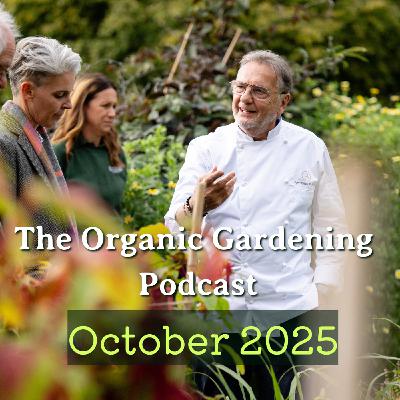
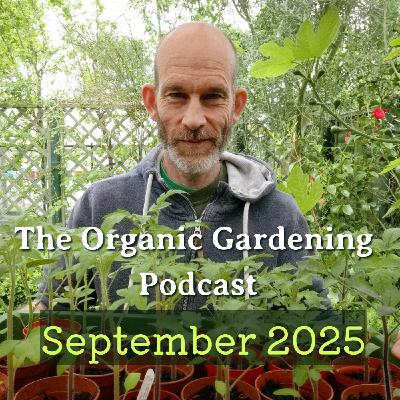
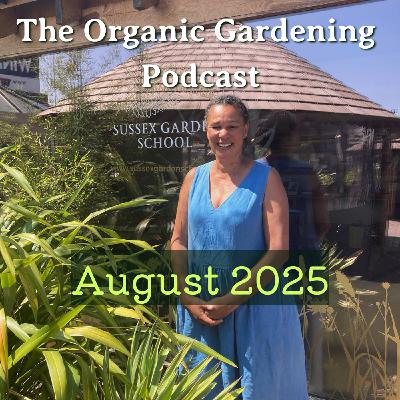
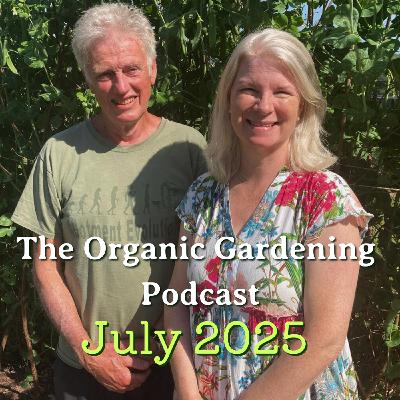
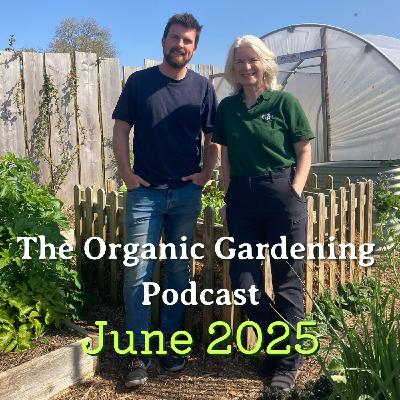
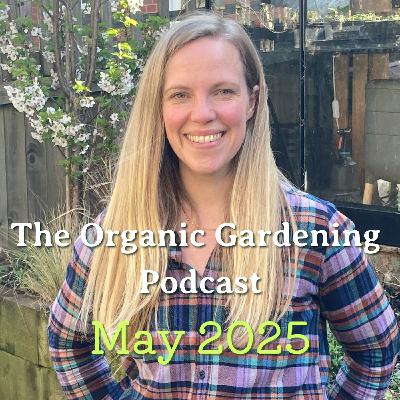
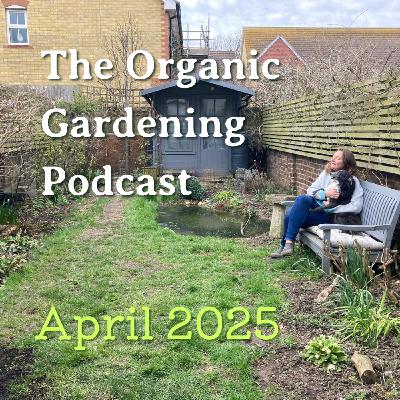
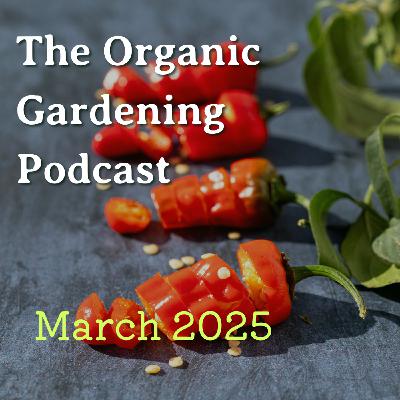
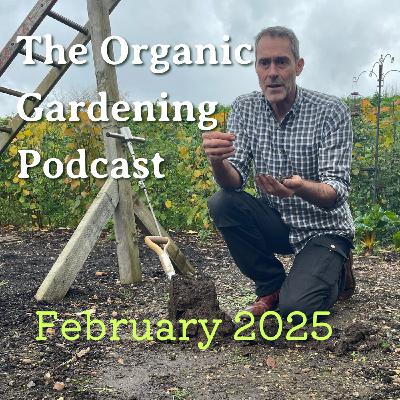
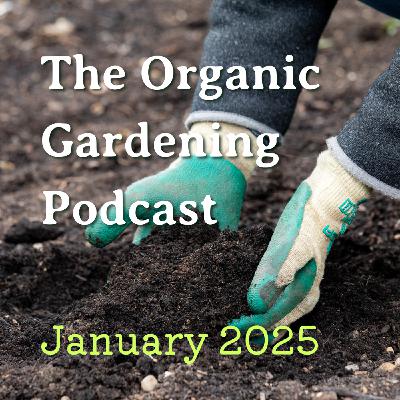




Re discussion about growing veg further north in U.K. I can recommend "Fruit & Vegetables for Scotland" by Kenneth Cox and Caroline Beaton. published by Birlinn.